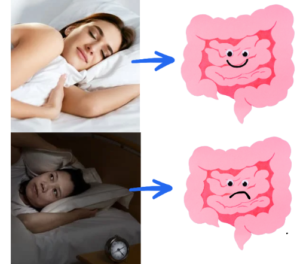Understanding the Critical Relationship Between Quality Sleep and Digestive Health
Sleep is far more than just a period of rest; it is an essential process that plays a profound role in influencing our digestion. This intricate relationship between sleep and digestive health encompasses a variety of physiological functions that work seamlessly together. The body’s circadian rhythm, often referred to as the internal body clock, synchronises both sleep patterns and digestive processes. This natural alignment explains why many individuals experience feelings of hunger at similar times each day, showcasing how our bodies are finely tuned to adhere to these fundamental biological rhythms.
Recognising the Importance of Quality Sleep for Enhanced Digestive Performance 
Sleep is essential for the body’s ability to heal, rejuvenate, and restore itself effectively. The deeper stages of sleep are particularly crucial for these restorative functions. During these profound phases, the organs, tissues, and cells that make up the digestive system not only relax but engage in vital repair processes. The body prioritises cellular repair and growth during deep sleep, especially regarding the regeneration of cells lining the digestive tract, which undergo continuous wear and tear due to exposure to food particles and digestive enzymes. This regeneration is vital for maintaining the integrity of the gastrointestinal lining, thereby enhancing the effectiveness of digestion.
Deep sleep also plays a significant role in strengthening the immune system, which is especially critical for the digestive system, as it is home to specialised immune cells activated by the beneficial bacteria present in the gut. These immune cells are essential in protecting the gut and the entire digestive system from harmful microorganisms, ensuring a well-balanced population of bacteria within the gut environment.
Moreover, the organs within the digestive system are pivotal in detoxification, assisting in the removal of waste and harmful substances from the body. Deep sleep enhances this detoxification process by optimising the efficiency of the liver and kidneys, allowing these organs to function at their peak. This synergistic interaction between sleep and detoxification significantly bolsters overall digestive health and wellness.
Investigating the Relationship Between Gut Motility and Sleep Cycles
A fundamental aspect of digestion involves the effective movement of food and waste through the digestive tract, a process known as gut motility. This process experiences significant alterations during sleep. During both deep and light sleep, the rate of gut motility is markedly reduced. This decrease is a necessary adjustment, allowing the digestive system to conserve energy, which is then redirected towards repairing digestive tissues. Such energy conservation enables the digestive process to operate more efficiently when awake, optimising both nutrient absorption and waste elimination.
The migrating motor complex represents a series of contractions that occur during fasting periods, including while sleeping. This cycle is essential for gut motility, as it effectively clears away food particles and residue that may remain in the digestive system. This natural cleansing mechanism of the digestive tract reduces the risk of bacterial overgrowth, fostering a healthy gut environment. Notably, the migrating motor complex is most active during the night when individuals are fasting and asleep, underlining the critical role of sleep in protecting the health of the digestive system.
As dawn approaches, gut motility gradually increases, preparing the digestive system to efficiently process and digest food. This surge in motility can also initiate the first bowel movement of the day, illustrating the finely balanced relationship between sleep and gut motility. Understanding this connection is vital for optimising digestive health and enhancing overall well-being.
Examining Hormonal Interactions that Affect Sleep and Digestion
Ghrelin, often termed the hunger hormone, is a significant hormone that triggers appetite. In contrast, leptin informs the brain that the stomach is full, helping prevent overeating. Together, these hormones play a crucial role in appetite regulation, but their functions can be negatively impacted by insufficient sleep.
Even a single night of poor sleep can lead to increased levels of ghrelin, which can elevate appetite and often result in cravings for carbohydrates. This phenomenon is commonly described as feeling ‘hangry’. To complicate matters, levels of leptin can drop after a night of inadequate sleep, disrupting the signals that convey satiety. This creates a challenging situation where individuals may overeat and make poor food choices while struggling to recognise their body’s cues to cease eating. Although occasional poor sleep may not lead to severe consequences, chronic insomnia can result in serious digestive issues, including inflammation in the gut, liver disorders, gastroesophageal reflux disease, inflammatory bowel disease, and even colorectal cancer, alongside contributing to weight gain.
Understanding the Impact of Sleep Disruption on Digestive Health
Disruptions to sleep can lead to a range of digestive issues. Factors such as shift work, particularly night shifts, and experiencing jet lag can significantly disrupt sleep patterns and upset the body’s internal clock. Additionally, late-night eating or irregular meal timings can adversely affect the quality of sleep. The circadian rhythm that governs sleep is closely intertwined with natural sunlight, which is vital for sustaining a healthy sleep-wake cycle.
Regrettably, in our technology-driven world, many individuals spend much of their daytime indoors, leading to reduced exposure to natural light. This shift has resulted in increased exposure to blue light emitted by devices such as laptops, televisions, and smartphones, further disrupting the sleep cycle and sleep patterns, particularly when this exposure occurs shortly before bedtime.
The cumulative effects of these factors can lead to severe digestive issues, including diarrhea, ulcers, inflammatory bowel disease, or disruptions in the delicate balance between beneficial and harmful bacteria in the gut. This imbalance can also compromise the gut lining, exacerbating challenges related to digestive health.
Enhancing Microbiome Health Through Quality Sleep Practices
The microbiome comprises trillions of microorganisms residing in the gut, primarily composed of beneficial bacteria known as probiotics, along with viruses, fungi, and potentially harmful bacteria. These microbes are crucial not only for overall health but also for digestive health. They enhance immune responses and assist in digestion, facilitating the production of essential vitamins, enzymes, hormones, and amino acids. Recent research has indicated a significant correlation between the microbiome and sleep, suggesting that disrupted sleep or chronic insomnia can negatively affect the balance of these microbes, ultimately impacting digestive health and overall well-being.
Unpacking the Complex Interactions Between Microbiome Health and Sleep Quality
The relationship between sleep and microbiome health is intricate and multifaceted. Poor sleep can negatively impact microbiome health, while an imbalanced microbiome can also detrimentally influence sleep quality. To understand this complex interplay, one study has revealed a connection between a higher abundance of specific bacterial types in the gut and quicker sleep onset, along with fewer awakenings throughout the night. While this article cannot explore all findings in detail, the vital takeaway is that nurturing a diverse and abundant population of beneficial bacteria in the gut is essential for achieving optimal sleep, effective digestion, and sustaining overall health.
Analysing the Interrelationship Between Stress, Sleep, and Digestive Health
A common consequence of stress and anxiety is disrupted sleep. In turn, these mental health issues can also adversely affect the physical health and functionality of the digestive system. This disruption can lead to altered gut motility and contribute to conditions such as indigestion, ulcers, and irritable bowel syndrome. A key factor in this dynamic is the impact of the so-called stress hormone, cortisol.
The Effects of Cortisol on Digestive Processes
When cortisol levels rise, the body responds by entering a fight-or-flight state. This physiological reaction results in blood flow being redirected to critical areas such as the heart, brain, lungs, and muscles, while diverting it away from the digestive system. This response prepares the individual to either confront danger or escape, a reaction that was crucial for survival in earlier times.
In modern times, however, stressors are often less life-threatening, such as financial concerns, work pressures, or inadequate sleep. While short-term redirection of blood flow may be advantageous in acute situations, chronic stress can have detrimental effects on the digestive system, particularly regarding gut motility. This can manifest in symptoms such as constipation, diarrhea, indigestion, gas, and bloating. As such, implementing effective stress management strategies is essential for supporting both gut health and achieving quality sleep.
Ensuring adequate sleep is crucial for maintaining a healthy digestive system, as the connection between sleep and digestion is inherently interconnected. Prioritising effective sleep hygiene practices is vital for achieving restorative sleep. This includes minimising exposure to blue light from electronic devices, adhering to a consistent sleep schedule, creating a cool, dark sleep environment, avoiding food intake within two hours before bedtime, and ensuring exposure to natural light during the day, particularly in the morning.
References
Understanding Digestive Health and Circadian Rhythms
Exploring Sleep Dysfunction and Digestive Conditions
Examining the Link Between the Gut Microbiome and Sleep
Investigating Stress and Its Effects on the Digestive System
The Article: How Sleep Affects Your Digestive System appeared first on https://janestevensnutrition.com
The Article: Sleep’s Impact on Your Digestive System Explained appeared first on https://janestevens.net
The Article Sleep’s Impact on Digestive Health Explained Was Found On https://limitsofstrategy.com
